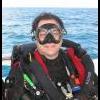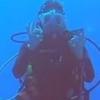
Buoyancy control
#16

Posted 21 September 2005 - 10:17 PM
#17

Posted 21 September 2005 - 10:35 PM
Once in a while, it is good to step back, take a breath, and remember to be humble. You'll never know it all - ScubaDadMiami. If you aren't afraid of dying, there is nothing you can't achieve - Lao-tzu. One dog barks at something, the rest bark at him - Chinese Proverb.
#18

Posted 21 September 2005 - 11:09 PM
This is not a one size fits all kind of thing. Talk to your instructor. See about coming before class or staying after to find out just what you need until you have it.Everyone in my class is wearing an 8 lb. weight belt -- regardless of body size.
You are paying for attention. Now, demand some customized attention for YOUR needs. Weighing you down enough to sit on the bottom and perform your skills is not where it's at. Doing a weighting check and finding out what you really need is where you want to be.
When you are out in the ocean is not the first time you are supposed to get it. That is when you are to apply what you already have learned. Your weighting needs will change in the ocean. So, you need to already know how proper weighting feels so that you can apply it there as you gain your experience.
"For the diligent diver, closed circuit rebreathers are actually safer than open circuit scuba." Tom Mount
#19

Posted 22 September 2005 - 07:29 AM
Welcome back to our little community! As for the bouyancy issues, your picture shows you diving in a full wetsuit but I can't tell if it is a 3, 5 or 7mm. You are weighted to about 10% of your body weight. Depending on the thickness of your suit, that may be too little especially if the suit itself is very bouyant. Our "rule" of thumb here for 7mm wetsuits is 10% of body plus 7 pounds.
If you are diving Al tanks, you probably know they get more bouyant as they empty so you have a continual change in your "weighting" based on that.
I dive "over-weighted" all the time to keep myself stable on the bottom when videotaping. In terms of bouyancy control it is easier to correct for over-weighting than under-weighting. Of course should your BCD fail, you will have potential problems due to the overweighting.
When I first started diving, no one used BCD's. We controlled our bouyancy by fine tuning our weighting for the set-up we dove. We also used our lungs a lot more for bouyancy control, a technique I still employ often. In fact there is an article on this by John Francis on p 77 of the October issue of Scuba Diving.
Again, welcome back on board!
#20

Posted 22 September 2005 - 07:42 AM
While the scientist in me says this is correct (and it is), the mystic in me agrees with DrDiver that bouyancy control has its Zen-like aspects!Achieving proper buoyancy is not some kind of mystical state of mind. It is simply a matter of physics.
I have fairly good bouyancy control and fine tuned it not by hovering (although that is a good test), but by "cruising." Before I had a back-up housing for my video camera, I had no way to film when my housing "flooded" or I scratched the front port. I "had" to find a reason to dive in the interim.
I decided it was a good time to practice skills. I fine tuned my bouyancy control by slowly swimming (barely kicking) through our dive park on a path perpendicular to the finger reefs that extend out from our breakwater. I used my lungs to control bouyancy as much as possible... breathing in to rise above the reefs and breathing out to sink once I was past them. I'm not talking about breath holding here, just controlled lung volume.
That practice helped me refine and maintain my skills. Of course this is essentially impossible to do in the average swimming pool and in many other dive sites.
#21

Posted 22 September 2005 - 08:36 AM
Susiq
#22

Posted 22 September 2005 - 08:55 AM
QUOTE (ScubaDadMiami @ Sep 21 2005, 08:36 PM)
Achieving proper buoyancy is not some kind of mystical state of mind. It is simply a matter of physics.
While the scientist in me says this is correct (and it is), the mystic in me agrees with DrDiver that bouyancy control has its Zen-like aspects!
Well, of course buoyancy is governed by physics-- that's obvious. But as far as pure diving enjoying it is at the level of turning buoyancy control into an unconscious act so that you can concentrate on other activities like identifying fish (in my case), it is very much a matter of turning it into an almost autonomic response. I don't consciously think about buoyancy contol now except under conditions that make it difficult. It's the mind and body controlling the physics of the state of buoyancy (which is a very Zen like concept).
#23

Posted 22 September 2005 - 10:00 AM
Great to read, Michelle! (insert *sigh of relief* emoticon here)Caetllonn - FYI, the good news is that bouyancy gets easier the deeper you get. In other words, IMHO, hovering in the pool is about the most difficult place to hover...
#24

Posted 22 September 2005 - 10:20 AM
AAAAAHHHHH! Why are people like this teaching? You should be individually weighted before you start working on buoyancy control. I weight students for skin diving before introducing SCUBA, then again when SCUBA is introduced. There should be no guess work involved in weighting.Howard,
Your advice is great, but I'm wondering how it applies to someone such as myself who is still doing confined dives in a pool and is having trouble with buoyancy/hovering. I don't know if this is standard everywhere else, but we haven't learned anything about weighting in a real-life situation. Everyone in my class is wearing an 8 lb. weight belt -- regardless of body size.
I'm not sure when and how individual weighting needs will be covered... I guess once we get to the ocean?
In the meantime, any and all suggestions, tales of woe, triumphs of achievement, etc. would be most appreciated!
Howard's advice is excellent. While there may be some zen like aspects, it is simply a skill that is learned like any other. One reason I enjoy diving in warm water is I handle all my buoyancy control with breathing. I weight myself properly and never have to add air to my BC. If you are diving with a wet or dry suit, you won't be able to do this.
DSSW,
WWW™
#25

Posted 22 September 2005 - 10:56 AM
True, but it is likely you are wearing a weight integrated BCD with more lift capacity than warm water BCDs. Ask them to split the weight up for you even in the pool until you feel comfortable and are not struggling for your buoyancy. Then you should be able to control your buoyancy with your lungs as Walter notes, which is nice!If you are diving with a wet or dry suit, you won't be able to do this.
If they don't tell 'em you have an instructor friend within driving distance....
Once in a while, it is good to step back, take a breath, and remember to be humble. You'll never know it all - ScubaDadMiami. If you aren't afraid of dying, there is nothing you can't achieve - Lao-tzu. One dog barks at something, the rest bark at him - Chinese Proverb.
#26

Posted 22 September 2005 - 11:50 AM
Nothing against Zen. So, I hope my earlier comments didn't come off the wrong way.It's the mind and body controlling the physics of the state of buoyancy (which is a very Zen like concept).
No question about it, the feeling of floating neutrally and freely in beauty on a great day is about as close to Nirvana as you can get.
The only problem is that most new divers can't understand such a feeling until they actually experience it. I am just trying to describe the mechanics of it so that they can get there. Once they are there, they will feel the Zen state. I sure do.
"For the diligent diver, closed circuit rebreathers are actually safer than open circuit scuba." Tom Mount
#27

Posted 22 September 2005 - 11:54 AM
With or without a weight integrated BC (no D), with or without a wet or dry suit, you fine tune buoyancy control with your lungs.
With a wet or dry suit, you have to deal with losing buoyancy due to compression of your suit as you descend. Often, especially with thicker wet suits and with dry suits, you lose a great deal of buoyancy in this manner. You need to add air to your BC/dry suit to compensate for loss of buoyancy. You usually loose too much buoyancy to compensate with just your lungs. Without a wet or dry suit, there is nothing to compress. You can use your lungs exclusively for buoyancy control if you are properly weighted.
DSSW,
WWW™
#28

Posted 22 September 2005 - 12:00 PM
The only problem is that most new divers can't understand such a feeling until they actually experience it. I am just trying to describe the mechanics of it so that they can get there. Once they are there, they will feel the Zen state. I sure do. divers.gif
You gave excellent advice, Howard and you're absolutely right, you have to master a basic level of buoyancy control before you can become comfortable in the water and experience the pleasure fully.
In my own instance as I developed my skill sets, I felt like I had good buoyancy control (could hover within six inches of a bar, etc) but when I finally forgot about doing all the things involved with buoyancy control and was able to do them subconsciously, I found that I could hover motionless for long periods of time--like watching a secretary blenny and trying to see his cirri with my magnifying glass. Again, a personal story and I'm not sure it's true for everyone--worked for me.
#29

Posted 22 September 2005 - 12:03 PM
Thank goodness somebody else had the nerve to come out with what I was really thinking. I really do not like sounding like the bad guy.AAAAAHHHHH! Why are people like this teaching? You should be individually weighted before you start working on buoyancy control. I weight students for skin diving before introducing SCUBA, then again when SCUBA is introduced. There should be no guess work involved in weighting.
It is most unfortunate that so many instructors intentionally overweight their students, and then lock them to the bottom of the pool (or ocean for their open water dives) so that they can pump them through their skills and move on. If students were instructed in their skills while also maintaining neutral buoyancy along the way, they would actually be ready to dive when they finish their initial training.
Think I am kidding? On a recent dive in a fairly strong current, my buddy and I followed the boat's anchor line from the wreck, intending to follow it to the surface. Instead of going up toward the awaiting boat above us, the line led out, away from the wreck, and then bowed down to the sand, where about ten divers were standing upright in the sand, holding the line. They were so overweighted that they were pulling the line down to the bottom even with a 35 boat being pushed by the current above them! BTW, these were not new diving students; they were "certified" Advanced divers.
These divers didn't even have a clue as to how overweighted they were because they were never taught properly from the beginning. Sometimes, people are lucky enough to figure these things out on their own sometime down the road. But, the instructor should at least start a student down the right path. Often, the instructor instead goes for the fast, temporary fix that will finish up the pool session 30 minutes faster. Now, that is a shame! :dltears:
"For the diligent diver, closed circuit rebreathers are actually safer than open circuit scuba." Tom Mount
#30

Posted 22 September 2005 - 12:10 PM
Hey Walter, we're clearly talking about the same thing. You say tomatoe I say tomato.Nicolle, I think we are talking about different things.
With or without a weight integrated BC (no D), with or without a wet or dry suit, you fine tune buoyancy control with your lungs.Â
With a wet or dry suit, you have to deal with losing buoyancy due to compression of your suit as you descend. Often, especially with thicker wet suits and with dry suits, you lose a great deal of buoyancy in this manner. You need to add air to your BC/dry suit to compensate for loss of buoyancy. You usually loose too much buoyancy to compensate with just your lungs. Without a wet or dry suit, there is nothing to compress. You can use your lungs exclusively for buoyancy control if you are properly weighted.
BCD - buoyancy control device.
But if you want to imply I am talking about something different than you, go ahead - whatever floats your BC!
Ulitmately I know we agree that people should be properly weighted and that's a great thing!
Once in a while, it is good to step back, take a breath, and remember to be humble. You'll never know it all - ScubaDadMiami. If you aren't afraid of dying, there is nothing you can't achieve - Lao-tzu. One dog barks at something, the rest bark at him - Chinese Proverb.
1 user(s) are reading this topic
0 members, 1 guests, 0 anonymous users


















